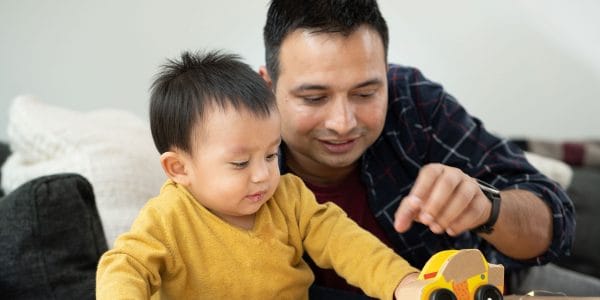NHS maternity, health visiting and other family services are failing babies by ignoring their fathers during the first postnatal year, according to a major new evidence review.
The review, conducted by the Fatherhood Institute and funded by the Nuffield Foundation, draws on a systematically collected body of almost 800 pieces of research exploring fathers and fatherhood in the first year – including many studies based on the UK’s three large-scale birth cohort studies, which track children’s outcomes over decades.
The review’s authors found that even without taking into account the COVID-19 lockdowns, during which fathers were routinely excluded from most elements of maternity services – and regardless of ongoing concerns over staffing – NHS systems are not set up to engage with, assess and support new fathers.
This is despite clear evidence that fathers’ physical and mental health impact on babies’ future health and well-being, including heightened risk of obesity, respiratory problems and impaired cognitive development – and that the perinatal period can be a ‘golden moment’ for encouraging better health behaviours among fathers.
Data gathering is a key problem. Health records for babies in the UK only allow the inclusion of one adult (the mother), so any record relating to the father is held separately (if it is held at all) and family records cannot be seen in a joined up and connected way. For this and other reasons, fathers have no status as patients or clients of maternity and other perinatal services. As a result, fathers are treated as visitors rather than central members of a new family. Health topics not routinely discussed with fathers include smoking, alcohol/drug use, and obesity – all associated with negative child outcomes.
The report found that fathers receive little or no support to develop their caregiving skills, help them understand child development or inform them how to keep their babies safe; nor are they screened for stress, anxiety, depression or other important psychological factors. This is despite the fact that, while almost all fathers (95%) take care of their crying infant regularly, 14% sometimes fear their stress levels are so high that it may harm their baby.
Fathers also have significant impacts on key maternal outcomes, including initiation and continuation of breastfeeding, and post-natal depression – which also impact on babies. But services do not provide information to help fathers in their support role, even though there is evidence that this can be highly effective – and 80% of new mothers say their infant’s father is their main source of support.
Key recommendations
- Fathers’ names, contact details and NHS numbers should be entered onto NHS birth notifications so that fathers can be contacted directly by services. As is the case for mothers, the father’s NHS number would link to his medical record for use by practitioners and for research purposes, within a framework of data protection law and ethical guidelines.
- All tax-funded services and interventions for families in the perinatal period – including those commissioned by central government (e.g. the Reducing Parental Conflict programme and Family Hubs) should be commissioned, designed, delivered, promoted and evaluated in ways that recognise fathers’ own need for support (whether or not they share a household with the child’s mother) and their impact on children and mothers. Practitioners should use evidence-based strategies to achieve high levels of father-inclusion, and should follow – and where relevant be inspected against – key guidance. The Fatherhood Institute is working with the Royal College of Midwives to produce a father-engagement toolkit, to be published in October 2022.
- The government should fund, pilot and evaluate a scalable, locality-wide approach to embedding father-inclusive practice across a whole network of perinatal services in a number of local areas.
- Given the unavailability of parental leave to the vast majority of UK fathers, and the huge significance of fathers’ participation in solo parental care in baby’s first year for later care patterns, the government should pilot new approaches to leave taking, focused on different groups of working fathers, including those who are employed, self-employed and working in the ‘gig economy’. Ways in which employers do or could support fathers should be included in the pilot.
Adrienne Burgess, Head of Research at the Fatherhood Institute, who co-authored the report, said: “We ourselves were stunned, when we pulled this research together, to discover the extent to which infant and child outcomes (and outcomes for mothers, too) are impacted by fathers’ behaviour and characteristics in the first few months after the birth. It is also deeply disappointing to discover that no systematic support is offered to new fathers by NHS providers – no recognition of their role, or even, sometimes, their existence.”
The pandemic has reshaped the balance of parents’ work and home lives and offers an opportunity to engage fathers better as equal partners in parenting. Huge strides could be made if the NHS, employers, and family and parenting services widened their perspective to consider fathers as well as mothers. This shift need not involve significant cost and could benefit families and children, by improving well-being and addressing inequalities.”Ruth Maisey, Education Programme Head at the Nuffield Foundation







































